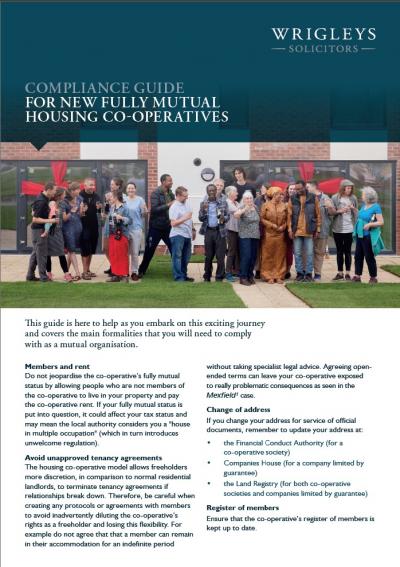Specialist legal advice for co-operatives, community benefit societies and mutuals
Wrigleys has worked with mutual societies for over thirty years, including community benefit societies, co-operative societies, friendly societies, mutuals, registered providers of social housing and trade associations. We are one of the few law firms which specialise in supporting organisations and businesses operating under these legal structures and have a unique knowledge to help you.
Our team of solicitors act for a wide range of societies, from local groups to multi-national organisations. Sectors we work in include housing (with clients such as housing associations, community-led housing groups, mutual home ownership societies and housing co-operatives), renewable energy, working men’s clubs. We also advise numerous ad hoc societies covering everything from community woodlands to community shops, community pubs and community transport.
Our advisors have also acted as consultants to the European Commission on co-operatives and advisers to the Charity Law Association regarding their model rules for a charitable community benefit society. We also attend regular round table events with the Financial Conduct Authority, contributing to their policy discussions and inputting on the way in which they register and regulate societies. This means we have first-hand experience of the sector and the key legal issues that these organisations face, and we regularly run free webinars and events to support the sector.
We are a member of Co-operatives UK and regularly attend events and seminars to share our knowledge and support the sector.
What is a community benefit society?
A community benefit society is an organisation which exists for the purposes of carrying on an industry, business or trade for the benefit of the community. The profits are reinvested into the business rather than being distributed to members, which reflects commitment to the wider community.
Community benefit societies may or may not have a statutory asset lock which limits what they can do with their assets. Societies without the statutory asset lock may register with HMRC for charitable tax status. Charitable community benefit societies are currently exempt from registration with the Charity Commission, although this is expected to change at some point in the future.
What is a co-operative society?
The Statement on the Cooperative Identity defines a co-operative as an “autonomous association of persons united voluntarily to meet their common economic, social and cultural needs and aspirations through a jointly owned and democratically controlled
enterprise.” In other words, a co-operative society is an organisation which exists for the purposes of carrying on an industry, business or trade, and is formed primarily to benefit their own members, who will participate in the business of the society.
How can Wrigleys help your organisation?
Our experience and the areas of work where we can help organisations include:
- Registration of (non-charitable) community benefit societies using the Wrigleys Community Interest Society model rules, with or without a statutory asset lock.
- Registration of charitable community benefit societies using the Charity Law Association model rules.
- Advising on exempt charitable status, including applications to HMRC for charitable tax reliefs.
- Establishing community land trusts, and advising existing community land trusts on their ongoing governance and legal requirements.
- Advising friendly societies (including working men’s clubs) on their governance, dissolution and on converting to a society registered under the Co-operative and Community Benefit Societies Act 2014.
- Rule amendments for co-operatives and community benefit societies.
- Transfers of engagements between registered societies.
- Amalgamations and mergers between two or more registered societies.
- Closure, winding up or dissolution of societies.
- Conversions from a company structure to a society structure and vice versa.
- Conversions from a friendly society or working men’s club to a community benefit society or a co-operative society.
- Raising finance by way of community shares and bond issues by registered community benefit societies.
- Advising on group structures with registered societies, including trading subsidiaries.
- General governance advice for societies.
- Interaction with the Mutuals Team at the Financial Conduct Authority.
- Advising on loan stock and tenancy arrangements between members of societies.
For further information, please feel free to contact us or subscribe to the Wrigleys' co-ops, community benefit societies and mutuals newsletter for the latest news and information.
Proud to be members of
‘Professional, knowledgeable and friendly service, fully familiar with clubs, associations, charities and companies limited by guarantee.’
Legal 500 (2026)















